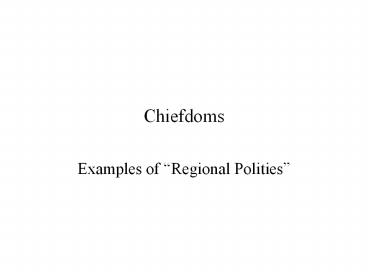Chiefdoms - PowerPoint PPT Presentation
Title:
Chiefdoms
Description:
Title: Simple Chiefdoms Author: Peter J. Richerson Last modified by: l Created Date: 4/22/2005 5:15:59 AM Document presentation format: On-screen Show – PowerPoint PPT presentation
Number of Views:58
Avg rating:3.0/5.0
Title: Chiefdoms
1
Chiefdoms
- Examples of Regional Polities
2
Some comments on JEs assessment of regional
polities
- Underestimate the size of acephalous societies
- Overestimate
- need for formal
- organization
- up to societies
- 10,000 people
3
Macroevolution again
- Population pressure cant be rate limiting step
- What is?
- Technology?
- Social organization?
- Many people suspect social organization
- Douglas North, Bob Bettinger
- The work-arounds hypothesis
- Hard to adapt people to live in big complex
societies - Social organization not observable and not
trialable
4
Some other important issues
- Functional versus conflict theories of social
complexification untangling a major social
science paradox - Leaders do have prosocial functions
- Formal offices invariably (?) lead to social
stratification - Polities do expand by violent conquest
- Why not democracy?
- Simpler societies egalitarian
- Big Man system proto-democratic
- Yet main path to complexity is via ranked
lineages and hereditary elite classes - Group selection favors social system with best
work-arounds - By conquest and by imitation
- Slow process
- More about this in Part II
5
Historical examples of social-organizational
breakthrus
- Shoshone minimalism
- Chinese Confucian merit bureaucracy
- Develops after 600 BC
- In West after 1700 AD
- Settling of California
- Anglos pioneered as family units, but with
cooperation via democratic institutions - Hispanics pioneered as larger extended family
groups - Anglo frontier moved faster because of greater
social flexibility
6
Marshall Sahlins (1963) Poor Man, Rich Man, Big
Man, Chief Political Types in Melanesia and
Polynesia
- Pacific islands as natural experiment
- Melanesia versus Polynesia
- Similar distribution of large and small islands
- Melanesians have Big Man systems even on very big
islands - Polynesians have chiefs even on small islands
- Human social organization is conservative on
millennial time scales historical versus
ecological causation? - Trobriand Islanders an exception? Melanesians
with a chiefdom? - Big advances in Oceanian anthropology since 1963
- Melanesia turns out to be culturally and
biologically heterogeneous
7
Austronesian phenomenonPatrick Kirch (2000) On
the Road of the Winds
8
Language map
9
Lapita Phenomenon
10
Lapita pottery very diagnostic(oddly,
Polynesians in the E. Lapita realm later abandon
pottery!)
11
Lapita expansion very rapid
12
Core technology basic tropical horticulture plus
13
Sailing leeward vs windward. Safeto beat to
windward. If you get into trouble you can sail a
jury rigged canoe downwind home.
Lapita navigation strategy
14
Austronesian sailors could point fairly close to
the wind
15
Austronesian exploration stategy
16
Ranked lineage social organization
Proto-Oceanic term for ancestor tumpu
Polynesian clans patrilineal Trobriand clans
matrilineal
The novel element is formal offices not dependent
upon the entrepreneurship of an ambitious
individual
In the Lapita case, chieftainship in an open
environment a stimulus to pioneering Every
successful pioneer a chief!
17
The Functions of Chiefs
- Domestic tranquilitysuppression of small-scale
warfare so prevalent in local-group societies - Provision of food security
- Store surpluses on large scale for redistribution
- Investment in large scale production
- Supervision of intertribal trade
- Investment in high tech canoes
- Provision of supernatural services (?)
18
Dysfunctions of Chiefdoms
- Hereditary principle unreliable supplier of
talent (but limits destructive competition for
office??) - Stratification breeds intra-societal tensions
- Violent conflict between chiefs often destructive
- Ideological exploitation of human credulity
19
The Trobriand Islands Case
20
Pioneering ethnographer Bronislaw Malinowski
studied Trobrianders 1914-1917
21
Subsistence tropical horticulture fishing
22
Gardening highly ritualized
23
Rather intricate gender division of labor in
gardening
24
Mature garden
25
Fishing major protein source
26
Stratified social organization
Chief Touluwa
27
Chief and his storehouse
28
Ceremonial display of harvest
29
Modern yam shelter
30
Kula Trade system
31
Kula Ring trade
Kula Ring trade
32
Armband
33
Necklaces
34
Ceremonial trade
35
Substantial canoes carry mundane cargoclay
pots, fine stone
36
(No Transcript)
37
Kula market
38
Evolution of Chiefdoms in Polynesia Rather Diverse
Open systems small, highly competitive chiefdoms
Near-state systems Tonga-Samoa Division of
religious and secular authority Hawaii
Class-based distinctions
39
Marquesian Open Sytem
40
Easter Island Collapse of open system
41
(No Transcript)
42
Hawaii
- Large island system
- Large population 250,000-800,000
- Several competing chiefdoms at contact
- United by Kamehameha with trade guns
- Notable for class system
- Chiefs ranked three deep
- Class of junior aristocrat managers
- Commoners divorced from ranked lineage system
43
(No Transcript)
44
(No Transcript)
45
Chiefly display feather cloaks
46
Economic intensification under chiefly supervision
Reef-flat fishponds
47
Pond-field irrigation systems
48
Population equilibrium?
49
Basseri
Notable features Pastoral tribe Component
of state Tribal chief part of state elite
50
Conclusions
- Tribes have formal leadership and usually
inegalitarian, stratified social relations - Kinship still the dominant social institution
- Chiefly economic functions various but important
- Inter-chiefdom trade and warfare often highly
organized - Easy to see how big chiefdoms become states






























